| General General | |
|---|---|
 Rank flag | |
.svg.png.webp)   Rank insignia of the Army, Amphibious Corps & Air force | |
| Country | |
| Service branch | Army Air Force Amphibious Corps (from 2000) Coastal Artillery (until 2000) |
| Abbreviation | Gen (Swedish)[1] (English)[2] |
| Rank group | General officer |
| Rank | Four-star[lower-alpha 1] |
| Non-NATO rank | OF-9 |
| Next lower rank | Lieutenant general |
| Equivalent ranks | Admiral |
General (Gen; Swedish: General) is a four-star commissioned officer rank in the Swedish Army, Swedish Air Force and Swedish Amphibious Corps. General ranks immediately above lieutenant general and is equivalent to admiral in the Swedish Navy. It is held by the Supreme Commander of the Swedish Armed Forces and the monarch.
History
In Sweden, the rank of general was a three-star rank until 1972 when it became a four-star rank. Historically, during the 20th century, lieutenant generals were promoted one grade upon retirement to full general. According to current practice only royals and the Supreme Commander of the Swedish Armed Forces, if he were to come from the Swedish Army, Swedish Air Force or the Swedish Amphibious Corps can hold the rank of a full, four-star, general in Sweden.
In 2009, the Swedish Armed Forces reported that General Håkan Syrén would retain his rank during his time as Chairman of the European Union Military Committee (2009–2012), which for the first time gave Sweden three active four-star generals; former Supreme Commander, General Håkan Syrén (2004–2012), current Supreme Commander, General Sverker Göranson (2009–2015) and Carl XVI Gustaf (1973–present).[3] This is correct since the rank of general since 1972 is a four-star rank. However, before 1972, the rank of general was a three-star rank, and between 1940 and 1941 Sweden had five active three-star generals; the Supreme Commander, General Olof Thörnell (1940–1944), General Oscar Nygren (1939–1941[lower-alpha 2]), King Gustaf V (1898–1950), Crown Prince Gustaf Adolf (1932–1973) and Prince Carl, Duke of Västergötland (1908–1951).[5]
Following a proposal from the Swedish Armed Forces, the Government of Sweden decides on employment as a general.[6]
In everyday speech, generals of all ranks are addressed as generals.[7][8]
Rank insignia
Collar patches

 Collar patch m/58 (black m/02) on field uniform M90
Collar patch m/58 (black m/02) on field uniform M90
(2002–present) Collar patch m/58 (gold) on uniform m/58-m/59 and field uniform M90
Collar patch m/58 (gold) on uniform m/58-m/59 and field uniform M90
(1983–2002) Collar patch m/58 (gold) on uniform m/58-m/59 and field uniform M90
Collar patch m/58 (gold) on uniform m/58-m/59 and field uniform M90
(–2002) Collar patch m/58 (bronze) on uniform m/58-m/59
Collar patch m/58 (bronze) on uniform m/58-m/59
(1972–1983) Collar patch m/58 (bronze) on uniform m/58-m/59
Collar patch m/58 (bronze) on uniform m/58-m/59
(1958–1972) Collar patch on uniform m/1923
Collar patch on uniform m/1923
(1923–1939)
Shoulder marks
 Shoulder mark on uniform m/87 (Army and Air Force)
Shoulder mark on uniform m/87 (Army and Air Force)
(1987–present) Shoulder mark m/87 on white shirt (Army and Air Force)
Shoulder mark m/87 on white shirt (Army and Air Force)
(1987–present) Shoulder mark m/87 on white shirt (Navy)
Shoulder mark m/87 on white shirt (Navy)
(1987–present) Shoulder mark on uniform m/1939
Shoulder mark on uniform m/1939
(1939–1958) Shoulder mark on uniform m/1923
Shoulder mark on uniform m/1923
(1923–1939) Shoulder mark on uniform m/1910
Shoulder mark on uniform m/1910
(1910–1923)
Sleeve insignias
Amphibious Corps and Coastal Artillery
 Sleeve insignia for a general in the Amphibious Corps
Sleeve insignia for a general in the Amphibious Corps
(2003–present) Sleeve insignia for a general in the Amphibious Corps
Sleeve insignia for a general in the Amphibious Corps
(2000–2003)
and
Coastal Artillery (1972–2000) Sleeve insignia for a general in the Coastal Artillery
Sleeve insignia for a general in the Coastal Artillery
(1901–1972)
Air Force
 Sleeve insignia for a general (1972–present) (today only on mess dress uniform)
Sleeve insignia for a general (1972–present) (today only on mess dress uniform) Sleeve insignia for a general (?–1972)
Sleeve insignia for a general (?–1972)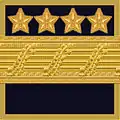
 Flight suit sleeve insignia for a general
Flight suit sleeve insignia for a general
(?–1972)
Army
 Sleeve insignia for a general on uniform m/1906
Sleeve insignia for a general on uniform m/1906
(1906–1923)
Hats
 Hat for general of any rank on uniform m/1865-99
Hat for general of any rank on uniform m/1865-99
(1865–?)
Personal flags
The command flag of a general (and an admiral) is a double swallowtailed Swedish flag. In the first blue field 4 five-pointed white stars placed two over two.[10]
List of generals
The following have been promoted to the rank of general in the Swedish Armed Forces between 1900 and 2024. This colour indicates that the person was appointed honorary general in the Swedish Army.
Footnotes
- ↑ General was a three-star rank until 1972 in the Swedish Armed Forces rank structure.
- ↑ Nygren left active service and was promoted to general in the army on 1 October 1937. He was recalled to active service to the post of commander of the 2nd Army Corps, where he served in Upper Norrland from December 1939 to April 1940 and in western Sweden from April to September 1940 and April to August 1941. Nygren was at the appointment in 1939 Sweden's only three-star general outside the royal family.[4]
- 1 2 The Supreme Commander of the Swedish Armed Forces used admiral's flag since 1942.[11]
- 1 2 3 4 5 6 7 8 9 10 11 12 13 Upon retirement.
- ↑ Upon retirement on 1 October 1937. However, Nygren was called back for service as commander of the 2nd Army Corps in Upper Norrland and in Western Sweden from 1939 to 1941.[4]
- ↑ Transferred to reserve in 1950, where he remained as lieutenant general until 31 December 1954. After resigning as Chief of His Majesty's Military Staff in 1963, Cederschiöld was promoted to general in the army on 23 May 1963.[14]
- ↑ Prince Bertil, Duke of Halland was general in the Swedish Army and in the Swedish Air Force (and admiral in the Swedish Navy).[15]
- ↑ King Carl XVI Gustaf is general in the Swedish Army and in the Swedish Air Force (and admiral in the Swedish Navy).[16]
References
Notes
- ↑ "Försvarsmaktens föreskrifter om personaltjänst (FFS 2019:6)" (PDF) (in Swedish). Swedish Armed Forces. 2019-12-02. p. 3. Retrieved 17 August 2020.
- ↑ "Försvarsmaktens gemensamma identitet – direktiv för användandet av Försvarsmaktens namn, profil och bild" (PDF). 1.3 (in Swedish). Swedish Armed Forces. 2013-09-16. p. 66. Archived from the original (PDF) on 23 February 2018. Retrieved 14 May 2019.
- ↑ Haglund, Sven-Åke (5 November 2009). "Håkan Syrén general i EU" (in Swedish). Swedish Armed Forces. Archived from the original on 17 January 2021. Retrieved 26 August 2020.
- 1 2 Cronenberg, Arvid (1990–1991). "Oscar E Nygren". Svenskt biografiskt lexikon (in Swedish). Vol. 27. National Archives of Sweden. p. 704. Retrieved 2016-07-11.
- ↑ Sveriges statskalender för skottåret 1940 (in Swedish). Uppsala: Fritzes offentliga publikationer. 1940. p. 268.
- ↑ "Förordning om ändring i förordningen (2000:555) med instruktion för Försvarsmakten" (PDF) (in Swedish). Swedish Code of Statutes. 20 June 2005. p. 2. Retrieved 21 August 2020.
- ↑ Etikett och god ton: Praktisk handbok i sättet att uppföra sig. 1 (in Swedish). Stockholm: Åhlén & Åkerlund. 1932. p. 128. SELIBR 1353820.
- ↑ Handbok: parad 6: traditionsvård : H PARAD 6 2016 (PDF) (in Swedish). Stockholm: Försvarsmakten. 2017. p. 31. SELIBR 22459606.
- ↑ Reglemente: uniformsbestämmelser 2015 : Unibest FM 2015 (PDF) (in Swedish). Stockholm: Försvarsmakten. 2015. p. 343. SELIBR 19513428.
- ↑ Braunstein 2004, p. 111
- 1 2 Lybeck 1945, p. 570
- ↑ Handbok: parad 4: marinen : R PARAD 4 2017 (PDF) (in Swedish). Stockholm: Försvarsmakten. 2017. p. 14. SELIBR 21485968.
- 1 2 3 4 5 6 7 Sveriges statskalender för år 1909 (PDF) (in Swedish). Uppsala: P.A. Nordstedt & Söner. 1909. p. 126.
- ↑ "Hugo Montgomery Cederschiöld". www.nordvik.se (in Swedish). Retrieved 19 March 2021.
- 1 2 Spiegelberg 1984, p. 404
- ↑ "Officiella fotografier" (in Swedish). Royal Court of Sweden. Retrieved 19 March 2021.
Sources
- Braunstein, Christian (2004). Svenska försvarsmaktens fälttecken efter millennieskiftet [The flags and standards of the Swedish armed forces after the turn of the millennium] (PDF). Skrift / Statens försvarshistoriska museer, 1101-7023 ; 7 [dvs 8] (in Swedish). Stockholm: Statens försvarshistoriska museer. ISBN 91-971584-7-X. SELIBR 9815350.
- Lybeck, Otto, ed. (1945). Svenska flottans historia: örlogsflottan i ord och bild från dess grundläggning under Gustav Vasa fram till våra dagar. Bd 3 [1815-1945] (PDF) (in Swedish). Malmö: Allhem. SELIBR 795890.
- Spiegelberg, Christina, ed. (1984). Sveriges statskalender. 1984 (in Swedish). Stockholm: Liber. ISBN 91-38-90400-4. SELIBR 3682782.




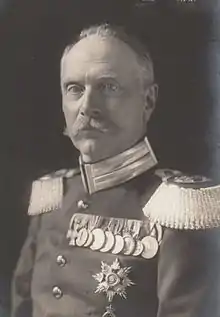
.jpg.webp)

.jpg.webp)

_milit%C3%A4r.jpg.webp)


.jpg.webp)



.jpg.webp)
.jpg.webp)

_AMA.0000803.jpg.webp)


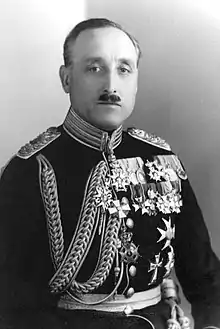
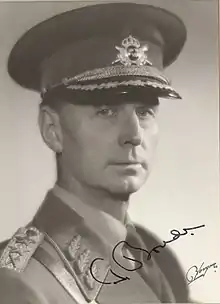

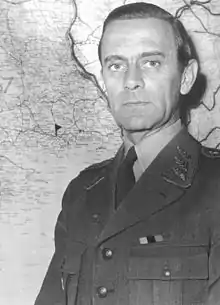
.jpg.webp)


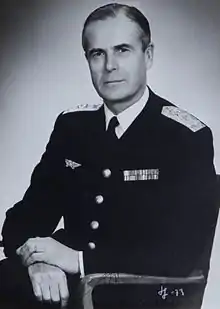
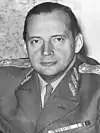
.jpg.webp)

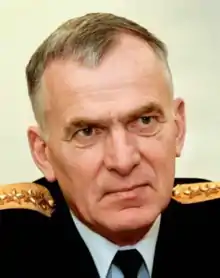
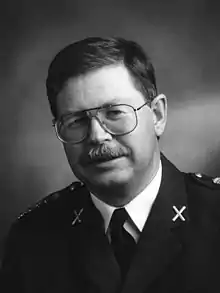


.jpg.webp)